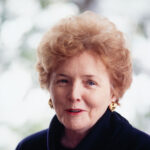
Susan Clayton speaks about the psychological effects of natural disaster with Los Angeles news podcast

Susan Clayton, Whitmore-Williams Professor of Psychology at The College of Wooster, spoke with “Press Play with Madeleine Brand,” a news podcast on NPR in Los Angeles about the meaning of ‘solastalgia’ and the psychological effects of natural disasters on Wednesday as smoke from fires on the West Coast continues to cause pollution problems in California.
Coined by an Australian philosopher, Clayton explained that “The term solastalgia comes from the word solace and the idea that places can be sources of solace for us, but when those places are destroyed—and it can be places that are personal to us or places more generally—then we have lost that. We feel pain at losing that source of solace.”
Clayton, whose research focuses on the psychological effects of climate change, added that “A lot of what we’re seeing and talking about these days is not just the feeling of loss but the sense that there will be loss to come. … We take for granted that the environment will persist more or less the same, that people will not be able to destroy the earth. Thinking about climate change calls those fundamental assumptions into question.”
In order to combat this feeling of not being in control, she notes that first finding out more about what’s going to happen and taking steps to be prepared such as having an emergency kit ready, can help offer comfort. Additionally, she recommends reaching out and connecting with others. “Finding a group of people to connect with and that could maybe just be your family and friends, or a politically oriented group will do several things,” she said. “It will validate your feelings because they have the same concerns you do. It will make you feel more effective because a group of people can do more done than an individual, and usually it will provide you with some positive experiences too.”
Taking actions on a personal level such as driving an electric car, giving up meat, or recycling, “can have a significant impact on reducing your climate footprint,” she noted, explaining that, “even though one person doing that doesn’t make a huge amount of difference. It doesn’t necessarily stop there. If you were to do that and talk to your friends about it, you would significantly increase the chance that one of them is going to do it too. There’s a ripple effect of changing social norms. Because all we can ever do is control our own actions, we need to bear in mind that your individual action doesn’t stop when you finish it. It can serve as a lever and have a larger impact.”
Posted in News on September 17, 2020.
Related Posts
Related Areas of Study
Psychology
Do research, work with faculty mentors, and tailor a psychology program to your interests
Major Minor

